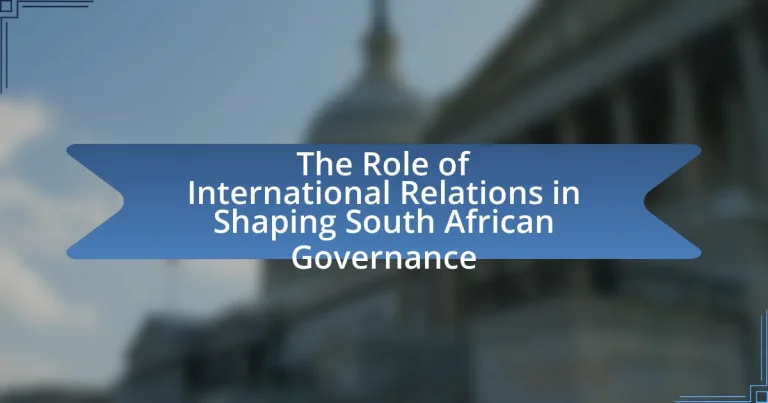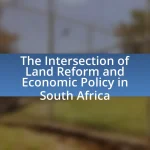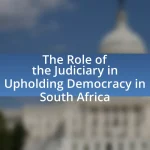The article examines the significant role of international relations in shaping South African governance, highlighting how global engagement influences policy decisions, economic strategies, and diplomatic relations. It discusses South Africa’s participation in international organizations such as the African Union and the United Nations, which facilitates collaboration on regional security and development issues. Key relationships with major global powers, including the United States and China, are analyzed for their impact on trade agreements and economic policies. The article also addresses how historical contexts, particularly the legacy of apartheid, have shaped current foreign policy and governance priorities, emphasizing the importance of international cooperation in addressing contemporary challenges.
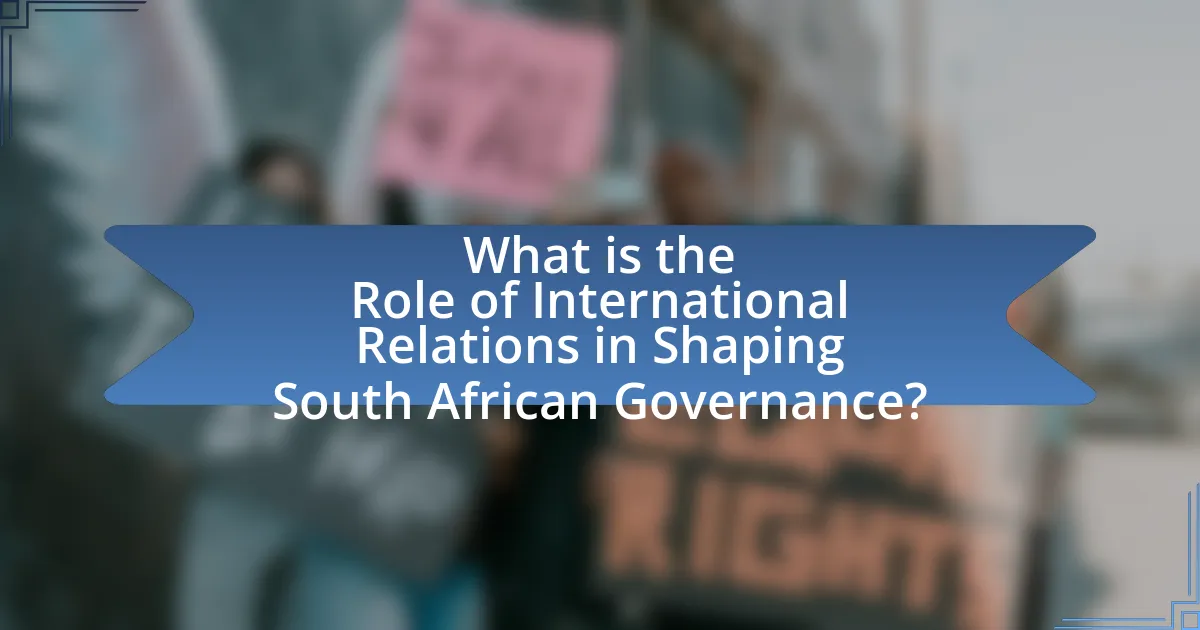
What is the Role of International Relations in Shaping South African Governance?
International relations play a crucial role in shaping South African governance by influencing policy decisions, economic strategies, and diplomatic relations. The country’s engagement in international organizations, such as the African Union and the United Nations, facilitates collaboration on regional security and development issues, which directly impacts domestic governance. For instance, South Africa’s foreign policy emphasizes human rights and democracy, reflecting its historical context and commitment to these values, as seen in its active participation in peacekeeping missions across Africa. Additionally, trade agreements and partnerships with countries like China and the United States shape economic policies, affecting governance structures and priorities. The interplay between international relations and governance is evident in South Africa’s response to global challenges, such as climate change, where international commitments drive national policy frameworks.
How do international relations influence governance structures in South Africa?
International relations significantly influence governance structures in South Africa by shaping policy decisions, economic strategies, and diplomatic engagements. The country’s foreign relations, particularly with key partners like the United States, China, and the European Union, dictate trade agreements and investment flows, which in turn affect domestic governance priorities. For instance, South Africa’s participation in the BRICS group has led to a focus on economic diversification and infrastructure development, aligning governance structures with international economic trends. Additionally, international human rights norms and standards impact South Africa’s legislative frameworks, compelling the government to align its policies with global expectations, as seen in its commitment to the African Charter on Human and Peoples’ Rights.
What are the key international relationships that impact South African governance?
The key international relationships that impact South African governance include its ties with the African Union, the United Nations, and major global powers such as the United States, China, and the European Union. These relationships influence South Africa’s policy decisions, economic strategies, and diplomatic engagements. For instance, South Africa’s role in the African Union allows it to shape continental policies on peace and security, while its partnership with the United Nations enables it to participate in global governance discussions. Additionally, trade agreements and diplomatic relations with the United States and China significantly affect South Africa’s economic landscape, as evidenced by the substantial trade volume between South Africa and China, which reached approximately $40 billion in 2020.
How do global political dynamics affect local governance in South Africa?
Global political dynamics significantly influence local governance in South Africa by shaping policy decisions, funding allocations, and international relations. For instance, South Africa’s participation in global organizations like the United Nations and the African Union affects its local governance structures, as these platforms often dictate frameworks for human rights, economic development, and environmental policies. Additionally, foreign investment trends, driven by global economic conditions, directly impact local government budgets and infrastructure projects. The 2019 World Bank report highlighted that fluctuations in global markets can lead to reduced local funding, affecting service delivery and governance effectiveness. Thus, the interplay between global political dynamics and local governance in South Africa is evident in policy alignment, resource distribution, and international cooperation efforts.
Why is international cooperation important for South African governance?
International cooperation is crucial for South African governance as it enhances economic development, security, and diplomatic relations. By engaging with global partners, South Africa can attract foreign investment, which is vital for job creation and infrastructure development. For instance, the African Growth and Opportunity Act (AGOA) has facilitated increased trade between South Africa and the United States, boosting the local economy. Additionally, international cooperation aids in addressing transnational issues such as crime and climate change, which require collaborative efforts for effective governance. The South African government’s participation in organizations like the African Union and the United Nations exemplifies its commitment to multilateralism, which strengthens its global standing and fosters stability within the region.
What benefits does international cooperation bring to South Africa?
International cooperation brings significant economic growth and development opportunities to South Africa. By engaging with global partners, South Africa can access foreign investment, which has been crucial for infrastructure projects and job creation. For instance, the African Growth and Opportunity Act (AGOA) has enabled South African exports to the United States to increase, contributing to a trade surplus and enhancing economic stability. Additionally, international cooperation facilitates knowledge transfer and technology sharing, which are vital for advancing sectors like renewable energy and information technology. This collaborative approach not only strengthens South Africa’s global standing but also fosters regional stability and security through partnerships in peacekeeping and conflict resolution.
How does South Africa engage with international organizations?
South Africa engages with international organizations through active participation in multilateral forums, diplomatic initiatives, and contributions to peacekeeping missions. The country is a member of key organizations such as the United Nations, African Union, and BRICS, where it advocates for issues like human rights, sustainable development, and regional stability. For instance, South Africa has played a significant role in the African Union’s peacekeeping efforts in conflict zones, demonstrating its commitment to regional security and cooperation. Additionally, South Africa’s involvement in the United Nations Security Council during its non-permanent membership from 2019 to 2020 allowed it to influence global governance and promote African perspectives on international issues.
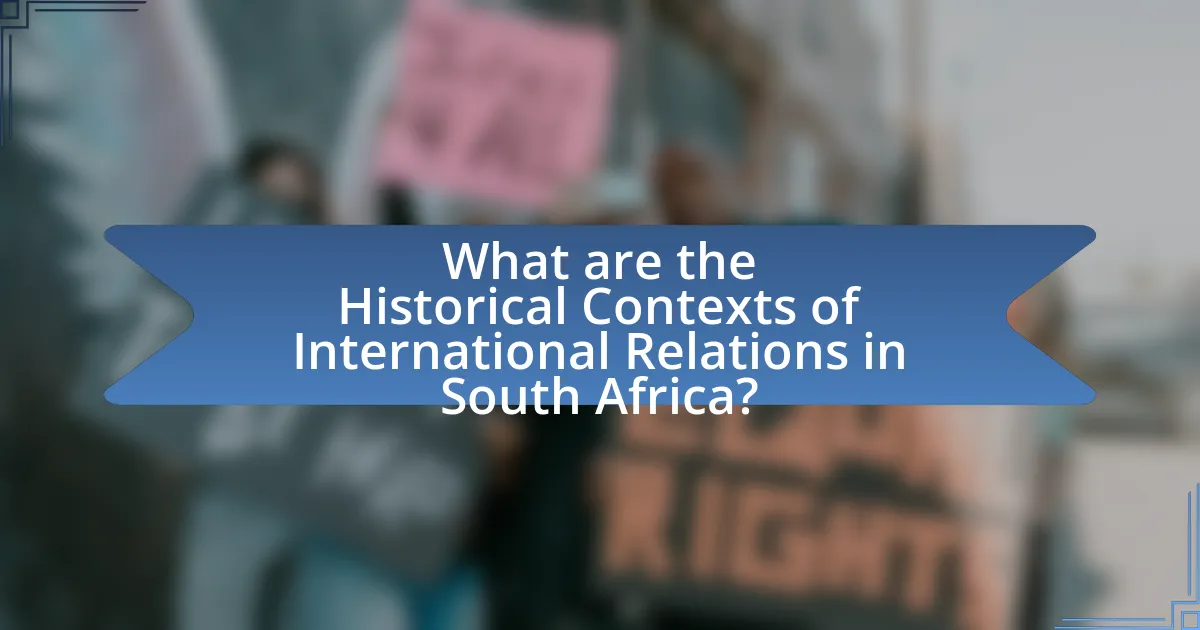
What are the Historical Contexts of International Relations in South Africa?
The historical contexts of international relations in South Africa are shaped by colonialism, apartheid, and the transition to democracy. Colonialism established exploitative relationships with European powers, leading to the marginalization of indigenous populations. The apartheid regime, which lasted from 1948 to the early 1990s, isolated South Africa internationally due to its racial policies, resulting in economic sanctions and diplomatic isolation from many countries. The end of apartheid in 1994 marked a significant shift, as South Africa re-engaged with the global community, promoting human rights and democracy, which was recognized through its membership in international organizations like the United Nations and the African Union. This historical trajectory illustrates how South Africa’s international relations have evolved from exclusion to active participation on the global stage, influencing its governance and policy-making.
How has South Africa’s past shaped its current international relations?
South Africa’s past, particularly its history of apartheid and subsequent transition to democracy, has significantly shaped its current international relations by fostering a strong emphasis on human rights and multilateralism. The end of apartheid in the early 1990s marked a shift in South Africa’s foreign policy, moving from isolation to active engagement in global affairs, as evidenced by its membership in organizations like the African Union and BRICS. This historical context has led South Africa to advocate for the rights of marginalized groups and to promote peace and stability on the continent, reflecting its commitment to the principles of democracy and equality established during its own transformative period.
What role did apartheid play in South Africa’s international relations?
Apartheid significantly isolated South Africa in international relations, leading to widespread condemnation and sanctions from the global community. The apartheid regime, which enforced racial segregation and discrimination from 1948 to the early 1990s, prompted countries and international organizations to impose economic and cultural boycotts, exemplified by the United Nations’ arms embargo in 1977 and the imposition of trade sanctions by various nations. This isolation hindered South Africa’s diplomatic relations and economic growth, forcing the government to seek engagement and reform to regain legitimacy and reintegrate into the global community. The eventual dismantling of apartheid in the early 1990s marked a pivotal shift, allowing South Africa to re-establish diplomatic ties and participate in international organizations, thereby transforming its international relations landscape.
How did the transition to democracy influence South Africa’s global standing?
The transition to democracy significantly enhanced South Africa’s global standing by fostering international legitimacy and strengthening diplomatic relations. Following the end of apartheid in 1994, South Africa was welcomed into various international organizations, including the African Union and the United Nations, which recognized its commitment to human rights and democratic governance. This shift led to increased foreign investment, as countries viewed South Africa as a stable and progressive nation, evidenced by a surge in foreign direct investment from $1.2 billion in 1994 to $8.5 billion in 2007. Additionally, South Africa’s role in peacekeeping missions and its leadership in regional initiatives further solidified its position as a key player in global affairs.
What are the key milestones in South Africa’s international relations history?
Key milestones in South Africa’s international relations history include the establishment of diplomatic ties post-apartheid in 1994, the country’s membership in the African Union in 2002, and its participation in the BRICS group starting in 2010. The end of apartheid marked a significant shift, allowing South Africa to engage with the global community and pursue a foreign policy focused on human rights and development. Joining the African Union demonstrated South Africa’s commitment to continental unity and cooperation, while BRICS membership highlighted its role in emerging economies and global governance. These milestones reflect South Africa’s evolving position in international relations and its influence on regional and global issues.
Which treaties and agreements have significantly impacted governance?
The treaties and agreements that have significantly impacted governance include the Treaty of Versailles, the United Nations Charter, and the South African Constitution of 1996. The Treaty of Versailles, signed in 1919, reshaped national boundaries and established the League of Nations, influencing international governance structures. The United Nations Charter, adopted in 1945, created a framework for international cooperation and conflict resolution, impacting governance on a global scale. The South African Constitution of 1996, which emerged from negotiations to end apartheid, established a democratic framework and human rights protections, fundamentally transforming governance in South Africa. These agreements collectively illustrate the profound influence of international treaties on national governance systems.
How have historical events shaped current foreign policy?
Historical events have significantly shaped current foreign policy by influencing national interests, alliances, and diplomatic strategies. For instance, South Africa’s transition from apartheid to a democratic government in the 1990s led to a foreign policy focused on human rights, regional stability, and economic partnerships. The end of apartheid prompted South Africa to engage more actively in international organizations, such as the African Union and the United Nations, promoting peacekeeping missions and conflict resolution in Africa. Additionally, historical ties with countries like the United States and the United Kingdom have shaped trade agreements and investment policies, reflecting a shift towards a more integrated global economy. These historical contexts provide a framework for understanding South Africa’s current diplomatic engagements and priorities on the international stage.
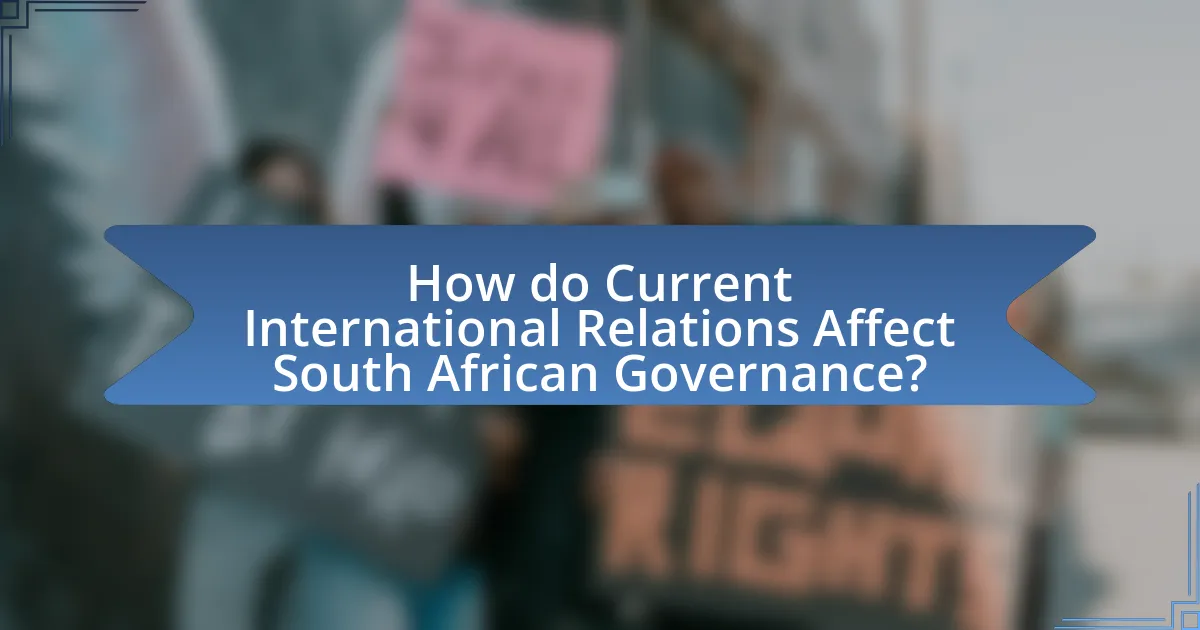
How do Current International Relations Affect South African Governance?
Current international relations significantly influence South African governance by shaping its foreign policy, economic strategies, and diplomatic engagements. For instance, South Africa’s membership in the BRICS group (Brazil, Russia, India, China, and South Africa) has led to enhanced trade relations and investment opportunities, impacting domestic economic policies. Additionally, South Africa’s stance on global issues, such as climate change and human rights, is often guided by its relationships with other nations and international organizations, which can affect its legislative priorities and governance frameworks. The country’s participation in the African Union also emphasizes regional stability and cooperation, further influencing its governance strategies.
What are the contemporary challenges in South Africa’s international relations?
Contemporary challenges in South Africa’s international relations include economic inequality, regional instability, and diplomatic tensions. Economic inequality hampers South Africa’s ability to engage effectively on the global stage, as a significant portion of its population remains impoverished, limiting the country’s soft power. Regional instability, particularly in neighboring countries like Zimbabwe and Mozambique, poses security risks and complicates South Africa’s role as a regional leader. Additionally, diplomatic tensions with countries such as the United States and China arise from differing political ideologies and trade practices, impacting South Africa’s foreign policy and international partnerships. These challenges are underscored by South Africa’s need to balance its domestic priorities with its international commitments, affecting its overall governance and influence in global affairs.
How do trade agreements influence governance policies in South Africa?
Trade agreements significantly influence governance policies in South Africa by shaping economic priorities and regulatory frameworks. These agreements, such as the African Continental Free Trade Area (AfCFTA) and various bilateral trade deals, compel the South African government to align its policies with international standards to enhance trade competitiveness. For instance, the AfCFTA aims to reduce tariffs and promote intra-African trade, which necessitates reforms in customs regulations and trade facilitation measures. Additionally, trade agreements often include provisions that require adherence to labor and environmental standards, prompting South Africa to adjust its governance policies to meet these obligations. This alignment not only fosters economic growth but also enhances South Africa’s global standing in trade relations.
What impact do international conflicts have on South African governance?
International conflicts significantly influence South African governance by shaping its foreign policy, security strategies, and economic stability. For instance, South Africa’s involvement in peacekeeping missions in conflict zones, such as the Democratic Republic of Congo, reflects its commitment to regional stability and influences domestic policy decisions. Additionally, international conflicts can lead to shifts in trade relations and foreign investment, impacting economic governance. The 2011 Libyan conflict, for example, resulted in South Africa reassessing its diplomatic ties and economic engagements with North African countries. These dynamics illustrate how external conflicts directly affect South Africa’s governance framework, requiring adaptive strategies to maintain national interests and regional influence.
How does South Africa’s foreign policy reflect its governance priorities?
South Africa’s foreign policy reflects its governance priorities by emphasizing human rights, economic development, and regional stability. The government prioritizes promoting democracy and social justice, which is evident in its active participation in international organizations like the African Union and the United Nations. For instance, South Africa’s commitment to the African Agenda highlights its focus on addressing socio-economic challenges within the continent, aligning with its domestic governance goals of poverty alleviation and sustainable development. Additionally, the country’s foreign policy initiatives, such as the BRICS partnership, aim to enhance economic ties and foster trade, supporting its priority of economic growth and job creation.
What are the main objectives of South Africa’s foreign policy today?
The main objectives of South Africa’s foreign policy today include promoting peace and security, advancing economic development, and fostering human rights and democracy. South Africa aims to contribute to regional stability through initiatives like the African Union’s peacekeeping missions and conflict resolution efforts. Economically, the country seeks to enhance trade relations and attract foreign investment, as evidenced by its participation in BRICS and various bilateral agreements. Additionally, South Africa advocates for human rights and democratic governance, aligning with its historical commitment to these values, as reflected in its Constitution and international engagements.
How does South Africa balance domestic and international interests?
South Africa balances domestic and international interests through a multifaceted approach that includes diplomatic engagement, economic partnerships, and adherence to international norms. The government prioritizes domestic stability and development while actively participating in global forums such as the African Union and the United Nations to advocate for its national interests. For instance, South Africa’s foreign policy emphasizes human rights and economic cooperation, which aligns with its domestic goals of social justice and economic growth. This dual focus is evident in initiatives like the African Continental Free Trade Area, which aims to boost intra-African trade while addressing local economic challenges.
What practical strategies can enhance South Africa’s governance through international relations?
Enhancing South Africa’s governance through international relations can be achieved by fostering strategic partnerships, engaging in multilateral diplomacy, and promoting trade agreements. Strategic partnerships with countries that share similar governance challenges can facilitate knowledge exchange and best practices, as evidenced by South Africa’s collaboration with the African Union to address governance issues across the continent. Engaging in multilateral diplomacy, such as participating in forums like the United Nations, allows South Africa to influence global governance standards and advocate for its interests, which has been crucial in addressing issues like climate change and human rights. Additionally, promoting trade agreements, such as the African Continental Free Trade Area, can stimulate economic growth and stability, thereby strengthening governance structures through increased revenue and investment.
